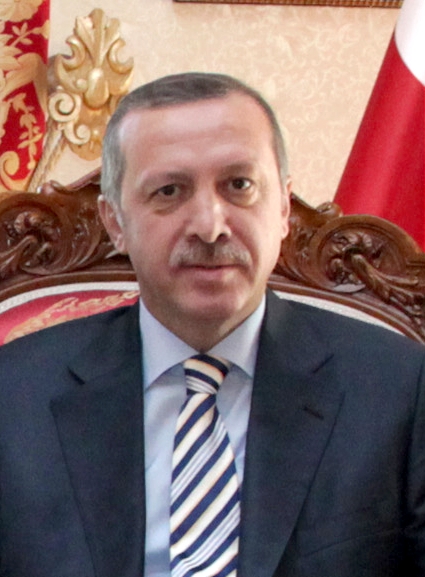 Turkish President Recep Erodgan Turkish President Recep Erodgan The Turkish military claimed that its planes had targeted Syrian Kurds in northwestern Syria according to the official news agency Anadolu. The jets hit 18 targets in a region north of the city of Aleppo. The agency quoted an army report claiming that between 160 and 200 fighters from the Kurdish YPG , the People's Protection Units, had been killed in raids that took place Wednesday night. However, a leader of Syrian-Kurdish fighters said that while jets and Turkish artillery were attacking that there were no more than 10 casualties. The monitoring group Syrian Observatory for Human Rights claimed that just 9 YPG fighters were confirmed dead and another 26 injured in a total of 20 raids.The Anadolu agency said that nine buildings including YPG headquarters, meeting places, shelters and weapons buildings were destroyed plus 4 vehicles. Al Jazeera was unable to obtain independent verification of the casualty figures. While the agency reported that Turkish-backed rebels had been attacked by the YPG, the Observatory had no record of any such incident, Another report by RT said that the Turkish military jusified the raids as a response to five shells that had been fired from the Kurdish-held region of Afrin. Although the shells did not cause casualties or damage, the resultant strikes were in line with Turkish rules of engagement. The attacks are bound to increase tension between the US and Turkey as the US considers the YPG a key player in the fight against the Islamic State (IS) in Syria. Turkey launched a ground operation against both the Islamic State in Syria and the YPG in August. It insists that the Kurds not advance west of the Euphrates river. Turkey considers the YPG be simply an extension of the Kurdistan Workers' Party (PKK) that it considers a terrorist group and which has carried out deadly attacks in Turkey during the last year. It remains to be seen what the US will say about these attacks.President Recep Erdogan said Wednesday that Turkey would go wherever terrorist organisations were and deal with them and not wait for them to come and attack Turkey. Turkey has been acting more aggressively beyond its borders of late. It has insisted that it should be part of the offensive against Mosul and will not withdraw its troops from Iraq as demanded by Baghdad. However, it has been excluded from the Mosul offensive.
0 Comments
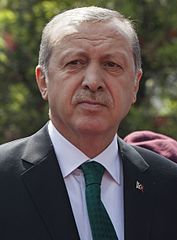 Recep Erdogan, Turkish president Recep Erdogan, Turkish president Turkey along with rebels it supports from the Free Syrian Army (FSA) started a new line of attack in northern Syria with tanks rolling across the Turkish border seizing several village from the Islamic State (IS). The incursion came from Kilis province, a province often targeted by IS rockets. Dogan news agency said Turkish tanks crossed into northern Syria from Kilis province on Saturday, while howitzers pounded ISIS positions in the area. There was a separate push by Turkish-backed rebels from the east. The rebels are mainly Arabs and Turkmen, part of the FSA. Last week rebels took the border town of Jarablus again with Turkish support. The operation called Euphrates Shield has the dual purpose of taking territory controlled by the Islamic but equally important to keep the US supported Kurds and their allies from advancing west of the Euphrates. The Turks worry that the Kurds could advance westward and link up with another Kurdish enclave further west. On Saturday Turkish tanks entered the town of al-Rai to support rebels who already control the town. Al-Rai is approximately 55km (34 miles) west of Jarablus. It is part of a 90 km corridor next to the border Turkey hopes to clear of the IS but also will serve to prevent any possible Kurdish expansion. A senior official, Zakaria Malahifiji said: "They took several villages, about eight villages. At first they took two and withdrew from them, but then reinforcements came and there was an advance. Turkish airplanes had carried out airstrikes on Arab Essa a village about 30 km west of Jarablus, that was captured today. Turkey disagrees with the US on the status of the Kurdish YPG militia. The US sees it as a key ally in attacking the IS whereas Turkey considers it a terrorist group. At the G20 meeting in China, Turkish president, Recep Erdogan, said: "There is no good terrorist. All terrorists are bad. All organizations involved in terrorism are cursed. This is how we see things and how we put up our struggle." Turkey claimed it had no desire to stay in Syria but was trying to protect its border from the IS and the YPG. It was thought that the rebels might move south towards the town of Mabij controlled by the Kurdish coalition of rebels supported by the United States. The Turks may believe that US pressure will convince the Kurds to move back to east of the Euphrates river. It remains to be seen if this will actually happen. It seems inevitable that the Kurds in Syria and the Turks will have difficult relations. 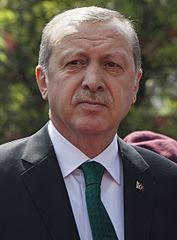 Turkish President Recep Erdogan Turkish President Recep Erdogan A minister in the Turkish government has rejected US claims that a temporary pause in fighting in northern Syria had been agreed upon by Turkish-backed rebels and Kurdish forces fighting in northern Syria. Omer Celik, EU affairs minister said to the state-run Anadolu news agency: "We do not accept in any circumstances ... a 'compromise or a ceasefire reached between Turkey and Kurdish elements. The Turkish republic is a sovereign, legitimate state." This statement appears to conflict with a statement by US officials that they had received assurances that all parties involved would stop shooting at each other and concentrate on fighting the Islamic State. Colonel John Thomas, spokesperson for the US Central Command said:"It is a loose agreement for at least the next couple of days and we are hoping that will solidify." Thomas claimed that the Turkey and the Syrian Democratic Forces (SDF) of which Kurdish People's Protection Units (YPG) are the main group had opened communications with the US and each other with the goal of limiting hostilities. Perhaps, the contacts are with Turkish supported rebel forces but without the blessing of the Turkish government. Turkey wants the Kurds to withdraw to east of the Euphrates river but there are still quite a number of SDF forces west of the river including in occupation of the city of Manjbi. Josh Earnest the White House spokesperson had already said: "The US welcomes the overnight calm between the Turkish military and other counter-ISIL forces in Syria. It continues to encourage these moves as a way to prevent further hostilities and loss of life between all counter-ISIL forces operating in the area." Polat Can, the YPG representative of the anti-ISIL coalition also claimed that the SDF had reached a truce with the Turkish-backed rebels saying in a tweet: "We have reached a temporary ceasefire between the Jarablus Military Council and the occupying Turkish army in the Jarablus area under the supervision of the global coalition."The conflicting reports could indicate that there are increasing tensions between the US and Turkey about the role of the Kurds in Syria. However, the US has also asked that the Kurds withdraw from positions west of the Euphrates. Indications seem to be that until the YPG withdraws east of the Euphrates Turkish attacks will not stop. Ten Free Syrian Army (FSA) groups who are part of the SDF led by the YPG have denounced Turkey's Euphrates Shield operation that is designed to expel the SDF as well as the IS from areas west of the Euphrates river. The group also complained of civilian deaths caused by the Turkish operation. The Euphrates Shield operation is itself carried out by FSA groups, Turkish-backed Islamist rebels, and Turkish military forces. The move threaten to divide the anti-IS coalition. Turkey considers the YPG a terrorist group and as much as a threat to Turkey as the IS. The US, on the other hand, regards the YPG as a key ally in fighting the IS. 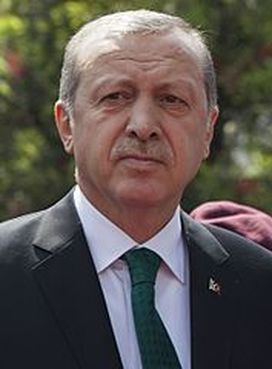 Recep Erdogan President of Turkey Recep Erdogan President of Turkey Turkey wants Kurdish militia to retreat from all areas it controls west of the Euphrates River. Turkey entered Syria allegedly to clear the Islamic State (IS) from Jarabulus, a town near the border. However it has also attacked units of the Syrian Kurdish People's Protection Units (YPG) as well. The US voiced concern about the development, as it has been supporting the YPG as part of a coalition that has been successfully gaining ground from the IS. Turkish president Recep Erdogan worries that the Kurds may establish an independent enclave on their border and also that the Kurds east of the Euphrates would link up with another Kurd-controlled area further to the southwest. In spite of the US saying that the Turkish operation was unacceptable, Turkey said it would continue operations against the Kurds unless they withdraw from areas they have taken west of the Euphrates River. The Turkish strikes against the YPG complicate the situation in Syria since the US supports the YPG as a key ally against the IS. The US has called the clashes unacceptable.US Vice President Joe Biden claimed last week that the US had ordered the YPG to retreat or risk losing US support but Turkey claimed it had seen no evidence of any withdrawal. Turkish Foreign Minister Mevlut Cavusoglu said: "The YPG... needs to cross east of the Euphrates as soon as possible. So long as they don't, they will be a target." He also accused the YPG of "ethnic cleansing" around the city of Manbji, west of the Euphrates, which the YPG captured from the IS earlier this month. Unlike the US, Turkey considers that the YPG is an offshoot of the Kurdistan Workers Party (PKK) that Turkey considers a terrorist organization.The YPG forces withdrew south of Jarabulus in order to protect lives of civilians but there are Syrian Democratic Forces (SDF) that include the YPG in and around the city of Manbji. A recent report claims Turkish and Kurdish forces have now a "loose agreement" to stop fighting each other according to John Thomas a spokesperson for the US Central Command. The two parties agreed to concentrate on fighting the IS. Thomas said:"It's a loose agreement for at least the next couple of days and we are hoping that will solidify." US relations with Turkey are already strained but at the same time the US has found the YPG to be a valuable ally in fighting the IS. 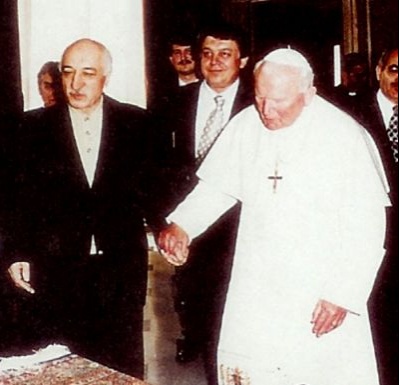 Gulen with Pope John Paul 1998 Gulen with Pope John Paul 1998 After Turkish President Recep Erdogan reportedly called the failed coup "a gift from Allah" some have suggested that the whole coup was faked so that Erdogan could suspend civil liberties and order mass arrests of his opponents.Some have even compared it with the 1933 arson attack on the German parliament building. The theory seems very improbable as Erdogan had difficulty even getting to communicate with the Turkish people and seemed genuinely frightened. At first the coup seemed to be going well. One twitter user suggested that it was probably a real coup that could have been vaguely known beforehand but was allowed to go ahead since it was known that it was weak and would not be successful. This at least is possible but more likely Erdogan simply did not know of the coup. Erdogan blames the coup on the Turkish preacher living in exile in the US, Fethullah Gulen, whose Gulen movement Erdogan describes as "an armed terrorist organization". At one time, before 2013 Gulen and Erdogan were allies but Gulen supported and even encouraged investigation of Erdogan and one of his sons for corruption. Erdogan accused Gulen of being behind the charges. Now he is on Turkey's most wanted terrorist list. Turkey is demanding that Gulen be extradited from the US to Turkey. For his part Gulen has been one of those who have claimed that the coup might have been a fake organized by Erdogan himself. While Gulen may have encouraged the coup, there was obvious dissatisfaction within the army although top officers did not seem to participate and police in Istanbul sided with Erdogan. Gulen denies he had anything to do with the failed coup. There is no doubt that Erdogan will use the coup as an excuse to purge the armed forces of any potential opponents. He has already cleared out many from the military and from the judiciary who were possible opponents. Turkish TV claims that 2,745 judges had been removed from their offices after the coup attempt. It is hard to believe that so many judges were supporting the coup. All opposition parties opposed the coup even the Kurdish party badly treated by Erdogan. However, Erdogan is likely to use the coup attempt as a reason to crack down further on any opposition. Erdogan already is criticized for repression of the media. It is reported that since 2014 a total of 1,845 journalists, writers, and critics have been charged with insulting the president which carries a potential jail sentence. Erdogan in this respect is following in the footsteps of Egyptian president El-Sisi and the Gulf monarchies. El-Sisi supported the coup since Erdogan is supported by the Muslim Brotherhood. Egypt blocked the UN Security Council from passing a motion condemning the coup. While Erdogan's position may be strengthened in the short term a large minority are much opposed to his increasing authoritarian actions combined with his reliance on support from Islamists. His suppression of the Kurdish minority is infamous. While Erdogan has begun to improve relations with Russia and Israel, his relations with the United States are under considerable strain. Turkey appears to be developing into an unstable country with too much power in the hands of a president who wants to stifle any opposition. |
Like this writer's work please donate:
Ken Hanly
Ken is a retired philosophy professor living in the boondocks of Manitoba, Canada, with his Filipina wife. He enjoys reading the news and writing articles. Politically Ken is on the far left of the political spectrum on many issues.
Archives
November 2016
Categories
All
|
 RSS Feed
RSS Feed

